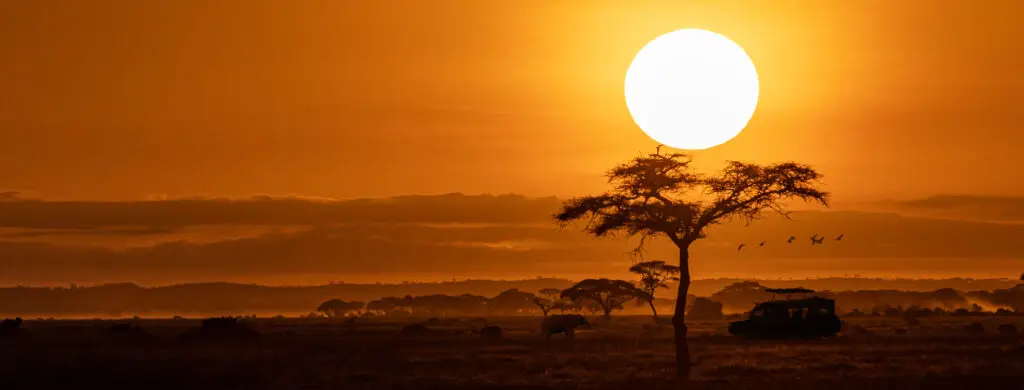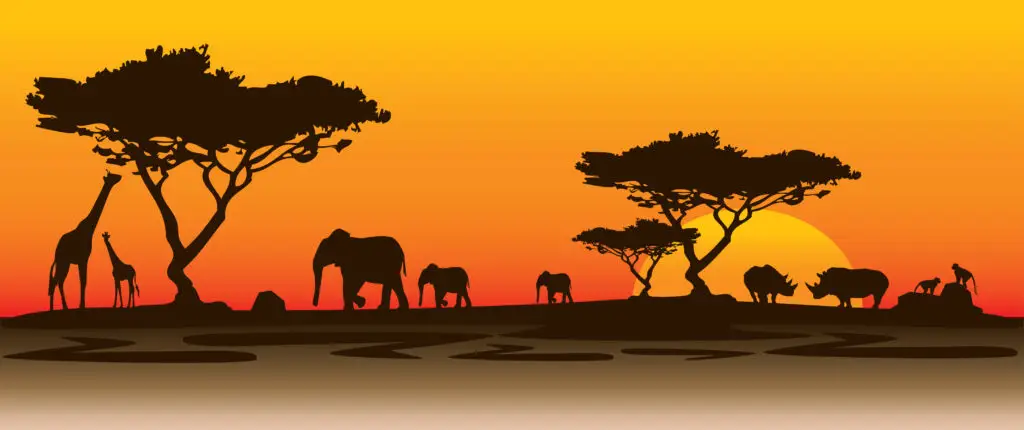
Where To Go on Safari in South Africa
South Africa has a lot of safari destinations to choose from, and the list can be intimidating. Here are some of the top options to consider:
- A Classic Home of the Big Five
Kruger National Park is South Africa’s largest and most famous national park, and it also offers some of the most classic safari experiences. Here is your chance to see the Big Five (lion, elephant, leopard, rhino, and buffalo), as well as a whole array of other wildlife.
- Malaria-Free Reserves
There are a few private malaria-free reserves, and Madikwe Game Reserve is a good choice for families and travelers concerned about their health. Close to the Botswana border, it has excellent Big Five sightings as well as luxurious lodges. Other malaria-free reserves include Marataba, Kwandwe, and Tswalu private reserves.
- Rhino Conservation
For some of the best spotting of black and white rhinos, Hluhluwe-Imfolozi Park in South Africa’s KwaZulu-Natal is where it’s at. This reserve is the oldest proclaimed nature reserve in Africa and, thanks to its conservation efforts, is home to one of the largest populations of white rhinoceroses in the world.
- Elephants En Masse
As its name suggests, Addo Elephant National Park is an elephant haven. Large herds of elephants, along with other wildlife like lions, black rhinos, and buffalos, roam this park. (It is also home to the Addo Elephant Trail Run, an intense – though beautiful – race through the park.)

- Luxury, Eco-conscious Experiences
Because they operate on a smaller scale, private game reserves all over South Africa (including in the Greater Kruger area) offer tailored, often luxurious safari experiences. The lodges are design-forward, guides and trackers offer unparalleled expertise and care for their environment, and there is a deep commitment to protecting the local ecosystem and environment. Big Five sightings might be traded for up-close encounters, night excursions, and guided walks – and the knowledge that unfenced boundaries with other protected lands give animals greater freedom to roam.
When to Go on Safari in South Africa
The best time to go on safari in South Africa depends on your priorities:
Winter Dry Season (May-October): This time of year is considered “peak season” for safaris. With less tree foliage, you’ll have a better shot at seeing animals in their habitat. This time of year is also when animals hang out around watering holes, which means more opportunity for game sightings. You can expect the weather to be mild, dry, and clear.
Summer Wet Season (November-April): While the dry season might be enticing for its good views of animals, the wet seasons is when the landscape comes to life. Lush and verdant, it’s a paradise for birders especially – and even more, with all the post-spring newborns, you might spot predators on the prowl. Daytime temps are warm, with cooler nights and the occasional afternoon storm, but prices are cheaper and crowds are fewer.
Your Safari Packing List
Here are some items to add to your safari packing list.
- Neutral-colored clothing: There’s a reason safari-goers are always depicted wearing shades of khaki and beige: Bright colors can disturb the animals!
- Layers: Days can grow hot and nights can quickly cool off. It’s always best to have packable, removable layers in the form of long-sleeved button ups and a light jacket.
- Long-sleeved tops and pants: To protect from mosquitos in the evenings.
- Insect repellent and anti-malarial medication: Consult your doctor if you’ll be traveling to a malaria-risk area so you can access prescription preventative medication.
- Comfortable walking shoes: Be sure to pack sturdy, closed-toed shoes.
- Sun protection: Sunscreen, hat, sunglasses, kerchief, etc.
- Binoculars and prescription glasses: It may seem obvious, but you’ll want to be sure you can see as far as possible!
- Camera with a good zoom: This one goes without saying.
- Mobile phone with data: Stay connected with a Red Bull MOBILE eSIM so you can share your adventures, read up on wildlife while on the go, access maps, and be able to communicate in case of an emergency.
eSIM Tip:
purchase and activate your eSIM from Red Bull MOBILE ahead of time so you will have immediate access upon arrival.
Ethical Considerations For Safaris in South Africa
Safaris aren’t all about seeing the Big Five; they are an opportunity to connect with nature and support conservation efforts and the local economy. Responsible tourism is the best way to ensure South Africa’s wildlife and ecosystems remain protected.
- Research tour operators: Choose safari operators and lodges that are committed to sustainable practices, conservation efforts, and fair treatment of staff and local communities. Operators should be 100% transparent about their efforts, and ready to answer any questions.
- Minimize your impact: While on safari, always respect the wildlife and your guide’s instructions. Keep yourself at a safe distance from animals, avoid making loud noises that could disturb the animals, and always stay on designated paths. Look for lodgings that offer advice on how you can conserve water and recycle waste responsibly, as well.
- Support conservation efforts: Look into organizations that are dedicated to wildlife conservation and anti-poaching initiatives, and avoid experiences that offer interaction with animals that goes beyond their nature (lion walks, predator petting zoos, elephant riding, etc.)
- Support local work: Try and hire guides and experts who are locals themselves or who have a deep connection to the local community.
Tips for an Unforgettable Safari Experience
- Respect your guide’s expertise: Your guide is your key to getting the most out of your safari. They are an expert on the local wildlife and environment, and will be a wealth of knowledge and tips.
- Be patient and measure your expectations: There’s no guarantee you will catch the Big Five, or even Three of Five! Delight in all the animals you’re seeing, big and small. Book a longer stay if you’re determined to see specific animals that can be hard to spot.
- Readjust your inner clock: Guides often embrace the cooler morning hours for game drives, but a late evening or night may also be in the cards. Remain flexible and ready for an adventure, no matter what time it is.
- Remember with your eyes, not your camera lens: Take all the photos and videos your heart desires, but be sure to pause and enjoy moments looking out at the nature around you. Appreciate where you are, and what you are seeing.
- Trust your tour operator: These folks are experienced professionals. Your guides know what they are doing and know how to keep you safe, so relax and enjoy this once in a lifetime experience.
